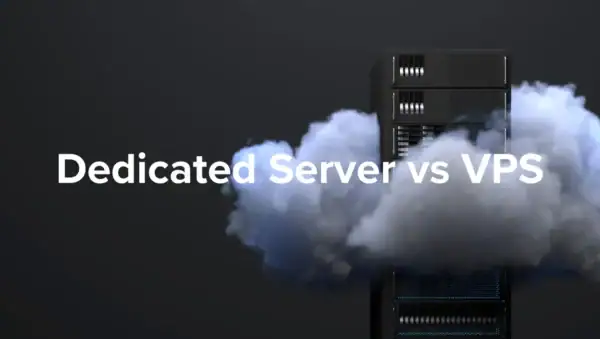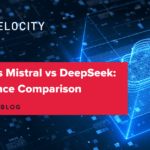Dedicated Server vs VPS: Which Should You Choose in 2025
- by Ashleigh Becker
 Choosing the right hosting solution is one of the most critical infrastructure decisions for any growing business. As your needs evolve beyond basic shared hosting, the debate often narrows to a dedicated server vs a VPS.
Choosing the right hosting solution is one of the most critical infrastructure decisions for any growing business. As your needs evolve beyond basic shared hosting, the debate often narrows to a dedicated server vs a VPS.
While both offer more power and control, they operate on fundamentally different principles that have major implications for performance, cost, and security.
A dedicated server, also known as a bare metal server, is an entire physical machine reserved for a single client. This gives you exclusive access to all its hardware resources—CPU, RAM, and storage—with no virtualization layer and no other tenants.
In contrast, a Virtual Private Server (VPS) is one of several isolated virtual machines running on a shared physical server. A hypervisor divides the host server’s resources, allocating a dedicated portion of CPU, RAM, and storage to each VPS, creating a private, self-contained environment on multi-tenant hardware.
This guide will dissect the key differences between a dedicated server vs. a VPS, providing the data-driven insights you need to make an informed decision for your specific workload in 2025.
Dedicated Server vs. VPS: The Key Differences at a Glance
|
Factor |
Dedicated Server |
Virtual Private Server (VPS) |
|---|---|---|
|
Performance |
Maximum and consistent. You get 100% of the server’s physical cores, RAM, and disk I/O with zero virtualization overhead or “noisy neighbor” effects. Ideal for resource-intensive, latency-sensitive applications. |
Strong but potentially variable. You get an allocated slice of resources. Performance is generally reliable on quality hosts but can be impacted by other tenants on the same physical machine, especially on oversubscribed, budget-friendly plans. |
|
Cost & TCO |
Higher initial cost, but better value at scale. Prices typically start from $50–$300+ per month. Can be more cost-effective for sustained, high-demand workloads due to a better performance-per-dollar ratio compared to high-end cloud VMs. |
Lower entry cost and more budget-friendly. Plans often start around $10 per month, making it an excellent, affordable step up from shared hosting. TCO is lower for small to medium workloads. |
|
Security & Isolation |
Maximum security. Complete physical isolation means no shared hardware with other tenants, eliminating risks like hypervisor vulnerabilities and simplifying compliance for standards like PCI DSS or HIPAA. |
High security with software-based isolation. The hypervisor provides strong logical separation between tenants. While very secure on reputable platforms, it is still a multi-tenant environment, which may not meet the strictest compliance requirements. |
|
Control & Customization |
Total control. You can install any operating system, customize the kernel, configure hardware (e.g., RAID, GPUs), and access low-level settings like the BIOS via IPMI. |
High level of control. Full root access is standard, allowing you to install custom software. However, you cannot modify the underlying hardware or kernel in ways that affect the host node. |
|
Scalability |
Less flexible for vertical scaling. Upgrading CPU or RAM often requires scheduled downtime and a physical migration to new hardware. Horizontal scaling (adding more servers) is common for growth. |
Excellent for vertical scaling. You can easily upgrade your vCPU, RAM, and storage with a few clicks and often just a simple reboot. Perfect for businesses with fluctuating or rapidly growing resource needs. |
Understanding the Technology: What’s Under the Hood?
To truly grasp the dedicated server vs VPS debate, you need to understand the architectural differences that drive performance and reliability.
CPU Cores vs vCPUs
A dedicated server gives you access to full physical CPU cores. A VPS, on the other hand, provides virtual CPUs (vCPUs), which are typically threads of a physical core. Because of this, one dedicated core almost always outperforms one vCPU. Some high-end VPS plans now offer dedicated vCPU options, which guarantee exclusive access to a CPU core’s threads, but a bare metal server eliminates this complexity entirely.
Virtualization Overhead
The hypervisor that manages a VPS consumes a small portion of the server’s resources—a phenomenon known as virtualization overhead.
While modern hypervisors have become highly efficient (often with overhead in the single-digit percentages), this “tax” on performance does not exist on a dedicated server. For CPU-intensive applications, this can translate to a noticeable performance gain.
The “Noisy Neighbor” Effect
Because a VPS shares underlying hardware, its performance can sometimes be affected by other tenants on the same host node.
If another VPS is consuming excessive CPU, disk I/O, or network bandwidth, it can create contention and impact your application. This is the “noisy neighbor” effect.
A dedicated server, being a single-tenant environment, completely eliminates this risk, ensuring your performance remains predictable and stable.
Storage I/O Performance
One of the biggest performance differentiators is disk I/O. Dedicated servers can be configured with high-performance NVMe SSDs in custom RAID arrays, capable of achieving over 100,000 I/O operations per second (IOPS).
While many VPS platforms also use NVMe storage, the I/O is still shared across multiple tenants. For database-heavy applications, e-commerce sites, or any workload sensitive to disk latency, the direct, uncontended access of a dedicated server offers a significant advantage.
Network and Bandwidth
A dedicated server often comes with a dedicated network port (e.g., 1 Gbps or 10 Gbps), ensuring you receive the full bandwidth without contention.
Many VPS plans share a network uplink among multiple virtual servers. While they may advertise high port speeds, actual throughput can fluctuate during peak times if other tenants are also consuming significant bandwidth.
When to Choose a VPS
A Virtual Private Server is an excellent, versatile solution for a wide range of use cases. It strikes an ideal balance between cost, performance, and ease of management.
A VPS is the right choice if:
- You are upgrading from shared hosting: A VPS is the logical next step when your website or application has outgrown the limitations of shared hosting.
- Your budget is a primary concern: With plans starting as low as $10/month, a VPS offers a powerful hosting environment at an accessible price point.
- You need to scale quickly: The ability to upgrade your CPU, RAM, and storage on-demand makes a VPS perfect for startups and businesses anticipating rapid growth.
- You host multiple small to medium-sized websites: A single, robust VPS can efficiently host multiple websites (e.g., for an agency’s clients), each isolated in its own environment.
- You are setting up development or testing environments: The flexibility to quickly spin up, clone, and tear down instances makes VPS hosting ideal for development workflows.
When to Choose a Dedicated Server
A dedicated server is a powerhouse designed for workloads that demand maximum performance, security, and control. While the cost is higher, the investment is justified for business-critical applications where compromise is not an option.
A dedicated server is the right choice if:
- Your application is resource-intensive: Large databases, high-volume e-commerce stores, SaaS platforms, and big data applications all benefit from the raw power of dedicated hardware.
- You require consistent, predictable performance: For real-time applications like game servers, streaming media, or financial trading platforms, the stable, low-latency environment of a dedicated server is essential.
- You have strict security or compliance requirements: Industries handling sensitive data (e.g., finance, healthcare) often prefer or require the physical isolation of a single-tenant environment to simplify compliance with standards like PCI DSS or HIPAA.
- You need custom hardware or software configurations: If your workload requires specific hardware like a GPU for machine learning, a custom RAID configuration for storage, or a specialized operating system, a dedicated server is your only option.
- You have outgrown your high-tier VPS: If your application is consistently maxing out the resources of even the most powerful VPS plan, or if you’re experiencing performance issues due to the “noisy neighbor” effect, it’s time to upgrade.
The Final Verdict: Making the Right Choice for Your Business
The decision between a dedicated server vs a VPS is not about which is universally “better,” but which is the right tool for your specific job.
For most small to medium-sized businesses, startups, and developers, a VPS offers the perfect combination of affordability, performance, and scalability. It provides a powerful and reliable platform to grow on without the higher upfront costs of dedicated hardware.
For established businesses, enterprise-level applications, and any workload where performance and security are paramount, a dedicated server is the ultimate solution. It delivers the consistent, high-octane power needed to run mission-critical operations without compromise.
Evaluate your current needs, anticipate your future growth, and choose the solution that best aligns with your goals.
Ready to find the perfect hosting solution? Explore our dedicated servers today.


